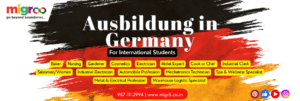Ausbildung in Germany | Everything you need to Know
Germany, renowned for its engineering prowess, high-quality education and robust economy, offers a unique vocational training system known as “Ausbildung.” This dual education system combines theoretical education with practical training, providing a comprehensive pathway for students and young professionals to enter the workforce equipped with both knowledge and hands-on experience. If you’re considering Ausbildung in Germany, here’s everything you need to know about this excellent opportunity.
What is Ausbildung?
Ausbildung, or vocational training, is a well-structured program that integrates classroom learning with practical work experience. It typically lasts between two to three and a half years, depending on the profession. The Ausbildung system is designed to cater to a wide range of industries, including technical fields, healthcare, business and the arts, ensuring that there is something for everyone.
The Dual System: A Unique Approach
The hallmark of the Ausbildung program is its dual structure, combining education at a vocational school (Berufsschule) with on-the-job training at a company. This system offers numerous advantages:
- Practical Experience: Trainees spend part of their week working at a company, gaining real-world experience and understanding the day-to-day operations of their chosen profession.
- Theoretical Knowledge: The rest of the week is dedicated to classroom learning, where students acquire the theoretical knowledge necessary for their field.
- Earn While You Learn: One of the most attractive aspects of Ausbildung is that trainees receive a monthly stipend from their employer, making it a financially viable option for many.
Who Can Apply?
The Ausbildung system is accessible to a wide range of applicants, including those who have completed secondary education and international students. Here are the key eligibility criteria and steps to apply:
- Educational Background: Typically, applicants need to have completed their secondary education (equivalent to the German Hauptschule or Realschule). However, some programs may require a higher level of education, such as the Abitur (equivalent to high school diploma).
- Language Proficiency: Since the training and coursework are conducted in German, proficiency in the language is essential. Many vocational schools and companies require proof of German language skills, usually at a B1-B2 level.
- Application Process:
- Research: Identify the profession that interests you. Resources like the Federal Employment Agency’s website and the BERUFENET database provide detailed information on various vocational fields.
- Find a Training Position: Look for open positions through job portals, company websites, or local chambers of commerce (IHK/HWK).
- Submit Your Application: Prepare a compelling application, including a cover letter, CV, and copies of your educational certificates.
- Interviews and Assessments: Be ready for interviews or assessment tests. This stage allows you to demonstrate your motivation and suitability for the training program.
Life as an Azubi
An Azubi (trainee) in Germany enjoys a well-structured training program that balances work and study. Here’s a glimpse of what to expect:
- Work Schedule: Typically, Azubis spend three to four days a week at their training company and one to two days at vocational school. The exact schedule can vary depending on the program.
- Mentorship and Support: Trainees are often assigned mentors who guide them through their practical training, helping them develop the necessary skills and competencies.
- Assessments: Throughout the Ausbildung, trainees undergo regular assessments to track their progress. These include practical tasks, written exams and in some cases, final projects or exams at the end of the training period.
- Community and Networking: Being an Azubi also means becoming part of a community. Trainees often form close bonds with their colleagues and peers, providing a support network and opportunities for professional networking.
Benefits of Ausbildung
- High Employment Rates: The Ausbildung system is highly regarded by employers in Germany. Completing an Ausbildung often leads to a job offer from the training company or other employers in the industry.
- Professional Recognition: The dual education system is recognized worldwide for its excellence. An Ausbildung certificate is a mark of high-quality training and expertise.
- Career Flexibility: The skills and experience gained during an Ausbildung are transferable, providing a solid foundation for various career paths, including further education and specialization.
- Financial Independence: With a monthly stipend, trainees can support themselves financially, reducing the burden of student debt and allowing for a more independent lifestyle.
Challenges and Considerations
While the benefits are substantial, it’s essential to be aware of the challenges:
- Intensive Schedule: Balancing work and study can be demanding, requiring good time management and dedication.
- Language Barrier: Proficiency in German is crucial since the training and coursework are conducted in German. International students may need to invest time in language courses before starting their Ausbildung.
- Adapting to a New Culture: For international trainees, adapting to German workplace culture and social norms can be challenging but also enriching.
Ausbildung in Germany: Exploring Course Options
Ausbildung in Germany offers a diverse range of vocational training courses, providing practical skills and theoretical knowledge across various industries. From healthcare to engineering, hospitality to information technology, there’s a course to suit every passion and career goal.
Healthcare: Courses in nursing, medical assistance, and healthcare administration prepare students for rewarding careers in the healthcare sector. With practical training in hospitals and care facilities, graduates contribute to the well-being of individuals and communities.
Engineering and Manufacturing: Ausbildung in mechanical, electrical, and industrial engineering equips students with the skills needed for careers in manufacturing, automation, and maintenance. From designing machinery to optimizing production processes, engineers play a crucial role in driving innovation and efficiency.
Hospitality and Tourism: Courses in hospitality management, culinary arts, and tourism offer opportunities to excel in the dynamic service industry. With hands-on training in hotels, restaurants, and travel agencies, graduates deliver exceptional experiences to guests from around the world.
Information Technology: Ausbildung in IT covers areas such as software development, network administration, and cybersecurity. With practical skills in coding, system management, and digital security, graduates are in high demand in the rapidly evolving tech industry.
Business and Administration: Courses in business administration, office management, and retail provide essential skills for success in administrative roles across various sectors. From managing finances to coordinating operations, graduates drive efficiency and productivity in businesses large and small.
Skilled Trades: Ausbildung in skilled trades such as carpentry, plumbing, and automotive mechanics offers hands-on training for in-demand professions. With a focus on practical skills and craftsmanship, graduates contribute to construction projects, infrastructure maintenance, and vehicle repair.
Creative Arts and Design: Courses in graphic design, multimedia, and fashion offer opportunities to unleash creativity and talent. With training in design software, artistic techniques, and industry trends, graduates pursue careers in advertising, media production, and fashion design.
Whatever your interests and career aspirations, Ausbildung in Germany provides a solid foundation for success in the global workforce, combining practical training with theoretical knowledge to prepare you for a fulfilling career.
Conclusion
The Ausbildung in Germany represents a unique and effective pathway to professional success. With its dual structure of classroom learning and practical training, it equips trainees with the skills and knowledge needed to excel in their chosen fields. Whether you are a local resident or an international student, pursuing an Ausbildung can be a transformative experience, opening doors to numerous career opportunities in one of the world’s most dynamic economies. If you are ready to embark on a rewarding career journey, Ausbildung might just be the perfect start.




